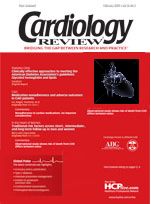How common is anemia in heart failure?
Over the past several decades, clinical research in cardiology has been driven, in part, by large, multicenter trials. These in turn have generated large clinical data sets, which have created both opportunities and challenges for clinical researchers. The opportunities lie in the ability to mine these data sets to establish correlations among clinical variables; the challenges lie in generating plausible hypotheses that provide insight into the pathophysiology of the underlying disease and strategies for novel treatments.
The current study by Anand and colleagues (page 12) is an example of both the strengths and limitations of this strategy. The investigators analyzed a group of 912 subjects with congestive heart failure (CHF) who were originally enrolled at multiple sites in a trial investigating the effect of a recombinant human tumor necrosis factor receptor that binds to and inactivates the soluble cytokine.1 The study was designed and powered to detect differences in the hard end points of all-cause mortality and repeat hospitalization and was terminated prematurely when it became clear that no differences were evident.
The 912 subjects subsequently provided a fertile data pool, and the present study derives from a posthoc analysis of clinical variables that correlated with adverse outcomes in this group, regardless of treatment strategy. This analysis strongly suggests that anemia is common in patients with moderately severe CHF (hemoglobin levels of less than 12.5 g/dL were seen in 20% of the cohort) and that the magnitude of the anemia is associated with greater disease severity, greater left ventricular mass (defined in a very small group of 66 subjects who underwent cardiac magnetic resonance imaging), and worse clinical outcomes. In a multivariate analysis, anemia appeared to be an independent predictor of outcome when the data were adjusted for intercurrent pharmacotherapy, New York Heart Association functional class, diastolic blood pressure, and creatinine (albeit at P = .021). While this is a powerful observation, it is certainly appropriate to caution that several other potentially important variables were not comprehensively evaluated, including age, sex, etiology of heart failure, and adequacy of pharmacotherapy, among others.
This observation that anemia is seen in heart failure patients and heralds poor outcomes is not novel to this analysis; it has been seen previously in other studies2-5 and is intuitively appreciated by heart failure physicians. What the finding tells us about the natural history of CHF, however, and whether correction of the anemia has the potential to affect this natural history is not answered by these studies, and is not at all clear.
Because the anemia is generally characterized as being reflective of a chronic disease, the finding may be a very indirect marker of disease severity or impaired renal perfusion and/or intercurrent renal disease. Alternately, the anemia may limit substrate delivery to skeletal muscle and amplify symptoms, tax the cardiovascular system, and accelerate the progression of the disease. Some data in support of this latter concept come from the work of Silverberg et al6 and Mancini et al,7 who showed that erythropoietin improved exercise capacity in small groups of patients with moderate to severe heart failure. Until we have more information about the reasons for the anemia and its contribution to disease progression, however, attempts to correct it with the expectation that we can alter disease progression seem premature.
